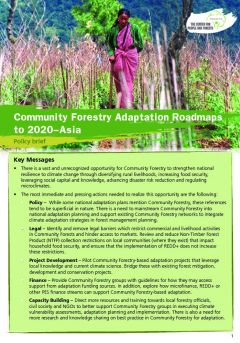Tenure issues in REDD+ pilot project sites in Tanzania
Enduring land and cultural sustainability for Ngāti Porou through afforestation subsidies
This is a Māori/Ngati Porou-led PES scheme that makes use of government afforestation subsidies and foreign direct investment to enable one of the tribe’s commercial bodies, Ngāti Porou Whanui Forests Limited (NPWFL) to become a provider of environmental services by undertaking afforestation activities to mitigate severe soil erosion and its negative effects on the Ngāti Porou community.
Informe del taller mesoamericano de capacitación para los inventarios de emisiones y planes de mitigación en el sector agricultura, uso de la tierra, cambio de uso de la tierra y silvicultura.
Este informe contiene los principales resultados del Taller Mesoamericano de Capacitación para los Inventarios de Emisiones y Planes de Mitigación en el Sector Agricultura, Uso de la Tierra, Cambio de Uso de la Tierra y Silvicultura, que se realizó en San José, Costa Rica del 21 al 23 de julio, 2014, a través de la coordinación del proyecto FAO sobre el Monitoreo y Evaluación de las Emisiones de Gases de Efecto Invernadero y el Potencial de Mitigación en la Agricultura (MAGHG, por sus siglas en inglés), el Programa ONU-REDD, y el Proyecto de Fortalecimiento de Capacidades REDD+ y Cooperació
林权改革 — 问题、原则和过程
有保障的权属是可持续森林管理的重要前提条件。更加多样化的权属体系可为改善森林管理、当地生计奠定基础,在森林管理能力较弱的国家尤其如此。过去10年间,很多国家开始改革森林和林地的权属安排,将获取和管理森林资源的权力在不同程度上从中央下放到家庭、私营公司和社区等主体。本书为政策制定者以及森林权属改革的参与者提供了切实可行的指导。书中引用了大量资料,包括粮农组织在非洲、东南亚、拉丁美洲和中亚开展的森林权属评估,得出一些经验教训,并阐明原因。本书列出了10条权属改革指导原则,提出因地制宜通过适应性的方式实现森林权属多样化。本书还强调,成功的权属改革与相关规范框架和治理安排改革相关联,因此必须将其放在更广阔的国家发展议程中来看待。
Strengthening Forest Tenure Systems and Governance
This publication is a result of a close collaboration between FAO and RECOFTC - the Centre for People and Forests. Many colleagues from both the FAO and RECOFTC as well as other training and tenure experts have provided useful comments and suggestions over the course of developing the materials. This module is designed for training involving a mix of participants interested in contributing to more effective forest tenure policy and programmes.
Social Equity in Community Forests: Two Case Studies from Nepal
Social equity is the fairness of treatment of all concerned stakeholders according to an agreed set of principles, particularly in procedures used to form and implement policies and in the distribution of resources and costs. In order to understand the practical implementation of various dimensions of equity in forest management, two case studies were carried out in two community forests (CF) of Nepal, namely Chisapani CF of Nawalparasi district and Bandre CF in Syangja district.
Community Forestry Adaptation Roadmap to 2020 for Vietnam
Community forestry supports local level climate change adaptation by enhancing resilience in multiple ways: supporting livelihoods and income, increasing food security, leveraging social capital and knowledge, reducing disaster risks and regulating microclimates. However, adaptation planning has, by and large, not included community forestry as a viable climate change adaptation tool.
Community Forestry Adaptation Roadmap to 2020 for Cambodia
Community forestry supports local level climate change adaptation by enhancing resilience in multiple ways: supporting livelihoods and income, increasing food security, leveraging social capital and knowledge, reducing disaster risks and regulating microclimates. However, adaptation planning has, by and large, not included community forestry as a viable climate change adaptation tool.
Community Forestry Adaptation Roadmaps to 2020 for Asia
There is a vast and unrecognized opportunity for community forestry to strengthen national resilience to climate change through diversifying rural livelihoods, increasing food security, leveraging social capital and knowledge, advancing disaster risk reduction and regulating microclimates. However maximizing the role for community forestry in climate change is an area where clear guidance and recommendations are lacking.
Community Forestry Adaptation Roadmap to 2020 for Thailand
Community forestry supports local level climate change adaptation by enhancing resilience in multiple ways: supporting livelihoods and income, increasing food security, leveraging social capital and knowledge, reducing disaster risks and regulating microclimates. However, adaptation planning has, by and large, not included community forestry as a viable climate change adaptation tool.






